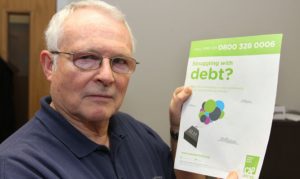At a recent training event for the Deacons at St Peter’s we were exhorted by David to realise the importance and vital responsibility of the church “to care for the poor”. This mandate for God’s people to be active in this ministry is clearly defined throughout the scriptures in word and example from the commands in Deuteronomy, throughout the Psalms, integral in the prophets’ teaching and especially in the New Testament teaching of Jesus and the Apostles.
The New Testament Christian communities in so many places demonstrated in so many ways the practical application of compassionate caring for the poor as they followed the instruction and example of the Apostles, Deacons and other “ordinary” identified church members. This was regarded as Normal Christian Life. Because we have such extensive and excellent Government Social Services does not exempt the church from fulfilling this Christian duty today.
In the parable of the Good Samaritan (Luke 10:25-37) Jesus illustrates most effectively the kind of response we should make to those who, often through no fault of their own, have been left battered, bruised and overwhelmed by life’s circumstances. The “Good Samaritan” cares for the man left by the roadside in a most comprehensive and holistic way and in so doing fulfils the call to go well beyond the extra mile! And Jesus said go and do the same!
Over the past four years I have had the privilege, challenge and direct experience of meeting with more than 80 people who have experienced the crippling anguish, dark despair, lonely anxiety and real helplessness that results from the poverty of being in debt. When I started my journey of working as a Debt Coach with the Christians Against Poverty (CAP) Debt Centre in Dundee, I now realise I had many misunderstandings and even judgemental attitudes towards those who found themselves struggling in debt situations. I hope that this article will help to foster some understanding and appreciation of the difficult situations people encounter in their lives and how we can be a genuine comfort to those in the distress and despair of poverty.
Once I used to think that those who found themselves in debt only had themselves to blame and that internal issues in their own lives had caused their plight. There is an element of truth in this belief but only in as much as so many people today including Christian folk (and even their leaders!) find themselves in situations where they too have “allowed the world to squeeze them into its mould” (JB Philips version of Romans 12:2).
There is this pressure in society “to must have the latest, the best and everything now.” There is a feeling we have the right to everything NOW because somebody else has it and we can not be seen to be different, stigmatised or disadvantaged in any way. The result is people are using readily available credit to obtain so many things, do things and go places. There is no culture, in the UK at least, which encourages people to BUDGET, SAVE and then SPEND. This is the well-established CAP MONEY Budgeting guideline which has helped thousands of people in the UK to take control of their finances and live in peace with a debt free lifestyle.
Because of this “all prevailing” social attitude and pressure, many people are “living on the edge” and are only the loss of three (or even less) income payments away from serious debt. In fact, at least 80% of the people we have been helping have been quite innocently oblivious to their precarious situation until that sudden CRUNCH of an income reduction or complete income loss happened.
My first experience of this crunch effect was a family couple with two children, where the husband was the sole wage earner. He was diagnosed with a serious chronic illness requiring hospitalisation over several months followed by continuous treatment for life. His income quickly dropped from £1500 to £400 a month for 5 months. It does not take much imagination to realise the crippling effect on the family budget. Attempts to shore up the finances with short term pay day loans and credit card use over the 5-month period resulted in a serious debt problem.
In other situations, the adverse life circumstances of: – unemployment/redundancy, business failure, chronic illness/disability, bereavement, unjust/unexpected benefit reductions, and the major problem of a relationship breakdown, have resulted in people quickly finding themselves in serious debt. They then revert to loans/credit cards to sustain even basic utility payments and hire purchase payments for what had now become an unsustainable lifestyle. It is these life crisis circumstances that result in the debt and the stigma of poverty.
In addition, however, a high proportion (70%) of the people we are helping find themselves suffering from an additional inability to cope in a rational or organised way due to an existing or consequential mental health problem. Despite the caring treatments and support available, these folk find themselves overwhelmed and often paralysed by the depressive phases of their illness and fail to respond to normal life requirements and end up in serious debt. But also fail to cooperate with the very people trying to help them
Working with CAP here in Dundee, we have wonderful people from four churches cooperating to provide the service of the Debt Centre and CAP Money Courses. We have had the great satisfaction of helping people to escape the trap of debt but more than that we have provided holistic care for these people and had the joy of introducing them to the reality of Jesus.
We have been involved in :- cleaning and decorating a kitchen damaged by fire for young couple with a new baby; thoroughly cleaning a flat for a disabled man; obtaining and delivering food parcels; providing emergency electricity and Christmas hampers for the especially disadvantaged; providing transport for clients and families to facilitate hospital visits and access to children visits; accompanying clients to meetings with other agencies and court appearances; moving furniture and goods; and praying with most at each visit.
All these activities are commensurate with the overall vision for the church to take the good news of Jesus to our communities by being good news to them and taking seriously the words of Paul “to remember the poor” (Gal 2:10).
Christians Against Poverty Debt Centre in Dundee has been provided by the cooperation of Broughty Ferry Baptist Church; GRACE Church in Menzieshill; Hillbank Evangelical Church in Hilltown and St Peter’s Free Church on Perth Road. For free Debt Help ring 0800 328 0006 and for CAP Money Budget Course ring 07947 419 806; email dundee@capuk.org
______________________________________________________________________________
Dr Chris Southwick is the manager of CAPs Dundee Debt Centre and a deacon in St Peters. He is also a dentist of over 40 years.
March 2018
______________________________________________________________________________



